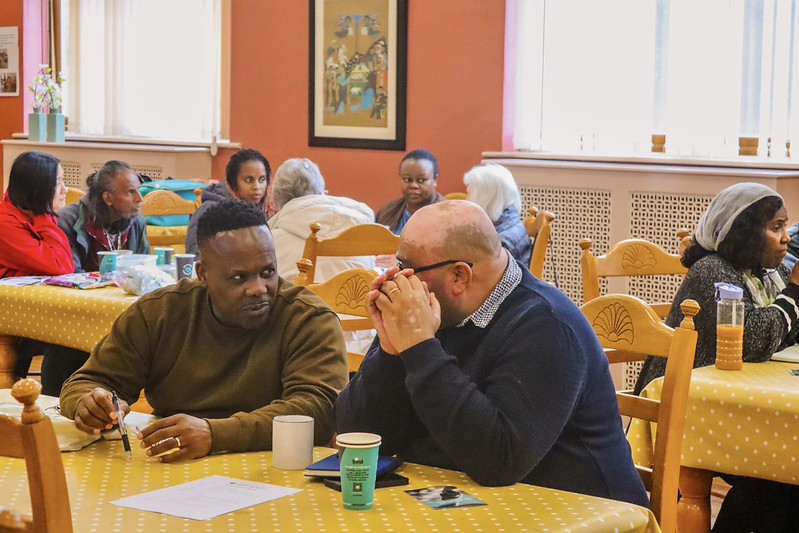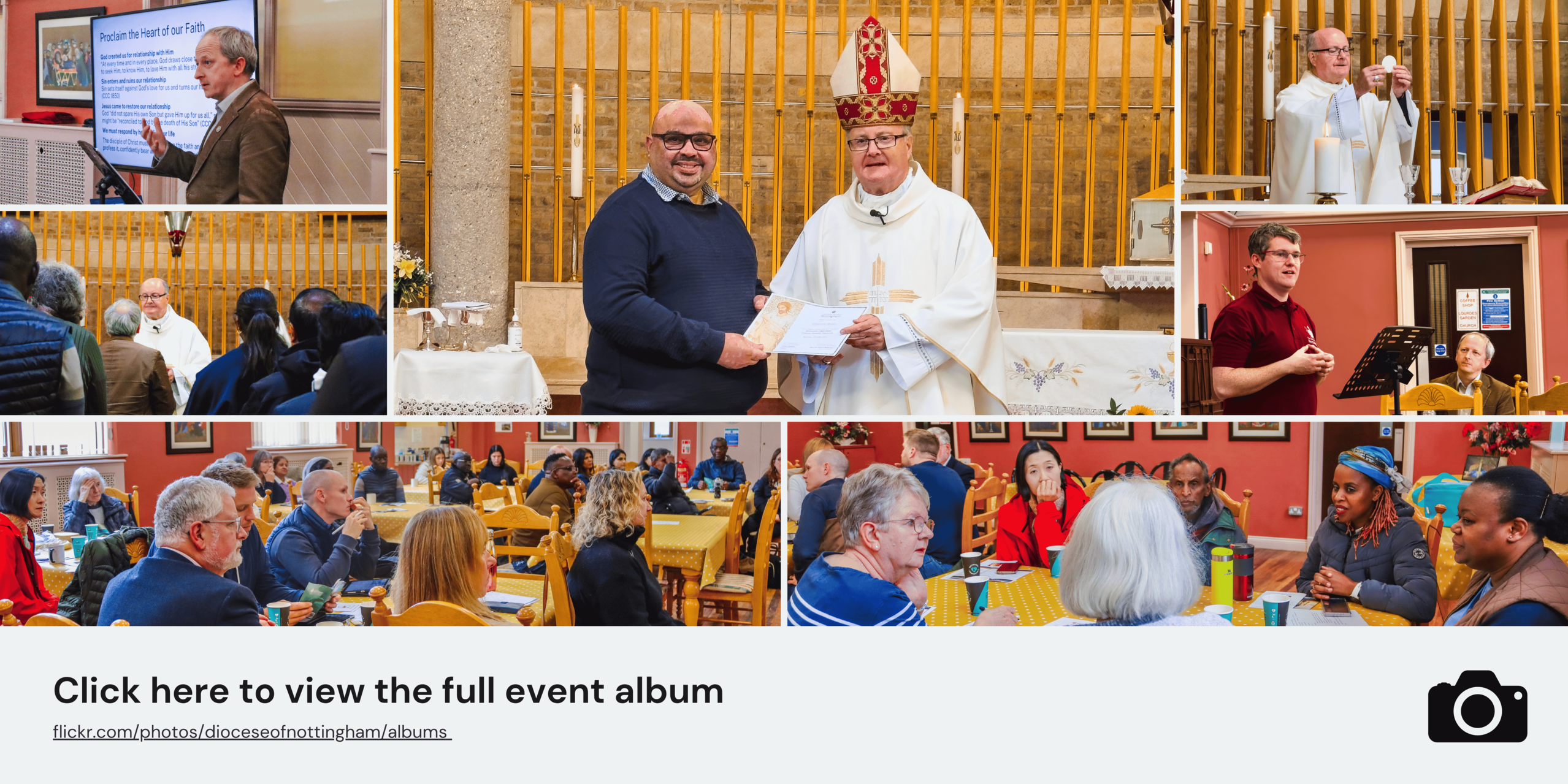
Dr Mark Nash, Director for the Agency for Evangelisation and Catechesis from Southwark, was the main speaker.

Source: Diocese of Nottingham
On Saturday 11th October the Diocese of Nottingham held the celebration of the Jubilee of Catechists at St Joseph’s Church in Leicester with 40 catechists present for this event. The day consisted of keynotes, Mass celebrated by Bishop Patrick and workshop sessions for the attendees.
Dr Mark Nash, Director for the Agency for Evangelisation and Catechesis from Southwark, was the main speaker delivering two keynotes with both exploring Sacred Scripture, Church teaching, and practical insights, challenging catechists to model their ministry on Jesus, the “great catechist”. Ways they were encouraged to do this was through embracing silence, storytelling, and the dynamics of influence, these were presented as essential tools for evangelisation.
Dr Nash opened by reminding the catechists that Jesus was an exceptional communicator, using parables, questions, and vivid storytelling to convey spiritual truth to people of every age. “If we want to be true catechists, we must look to Him as our model,” he declared, echoing Pope Leo XIV’s recent homily that “all have this developing faith” and that the invitation to deepen that faith begins in each parish.
A central theme of the keynote was the role of silence in preparing the heart for catechesis. Dr Nash cited the Gospel accounts of Jesus retreating to quiet places, for example, after healing the sick, noting that the Saviour “took forty minutes of silence after a long day of ministry.” He urged catechists to adopt a similar practice: a period of silence before each lesson to “find peace, listen with delight, and open our attentive eyes.”
Dr Nash highlighted that Jesus sought solitude not only for prayer but also as a means of communicating with God, preparing for important moments such as the Sermon on the Mount and the events leading up to his crucifixion. “These moments of silence were not merely private prayer; they were the wellspring from which His teaching flowed,” he explained, challenging catechists to demonstrate the importance of silence in their own ministries.
Moving from silence to speech, Dr Nash emphasised that reading Scripture must be accompanied by storytelling that connects with everyday life. He urged catechists to “read the Scripture, but tell it in a way that makes the Gospel come alive for families, schools, and neighbourhoods.” By weaving narrative threads that resonate with contemporary experiences, catechists can help believers encounter the “heroic journey” of faith.
Drawing on recent sociological research, Dr Nash pointed out that most people maintain close relationships with only six friends. In contrast, Jesus cultivated a widening circle of disciples—the Twelve, the inner trio of Peter, James, and John, and a broader community of followers. He asked the audience, “Are we comfortable speaking a set piece to a wide audience, or do we prefer intimate groups?” The answer, he suggested, lies in consistency—the same consistency that marked Jesus’ teaching, prayer, and silence.
Dr Nash introduced the “hero theory” popularised by Joseph Campbell, outlining the stages of a hero’s adventure: meeting the mentor, crossing the threshold, facing trials, receiving the reward, and returning transformed. He argued that catechists are the mentors, not the heroes themselves. Their role is to provide the initial impetus, equip the faithful with the tools of faith, and support them as they embark on their own spiritual quests.
“We are not the heroes; we are the mentors who set the path and provide the tools,” Nash quoted, echoing St Augustine’s reminder that “Lord Jesus Christ, God-man, is both a manifestation of divine love towards us, and an example of human humility with us, to the end that our great swelling might be cured by a greater countering remedy…”
The keynote concluded with a reminder of the universal call to holiness and mission: The Church is the visible body of Christ, the Holy Spirit flows through the faithful, and every Catholic is called to proclaim the Good News with joy and hope. Dr Nash urged catechists to embody this mission by fostering a sense of community that keeps people from drifting away, emphasising that God’s love, manifested in the sacrifice of His Son, remains the foundation of all catechetical work.
In between the keynotes, the attendees joined in with a Mass celebrated by Bishop Patrick McKinney, who also imparted a Jubilee blessing on the catechists during the Mass.
The Mass was celebrated for the Memoria of Pope St John XXIII who called the Second Vatican Council; Bishop Patrick highlighted one of the greatest fruits of the Council was the Catechism of the Catholic Church, a wonderful resource for catechists. To commemorate this celebration, the Bishop said in his homily:
“Thank you in your generosity and willingness to serve this diocese. This is a most important service, as catechists you share in bond one of the most essential and central ministries of the church, teaching of the faith. A faith which traces its origin and identity back to the very beginning of the church.
“The Lord deeply desires that we know and love him personally. This is so important, and I will keep on saying it, because as you know in your work still too many Catholics are not convinced that God loves them individually and wants a personal relationship with them. The truth is none of us will ever be effective in helping others to believe to know this, unless each of us is not only convinced of this truth, but is constantly trying to develop personal, living relationship with the Lord.”
The Diocese’s Adult Formation for Mission team will be launching this years Catechist course in November, to sign up or to ask for more information please email: formation@dioceseofnottingham.uk
Latest news from
Formation for Mission